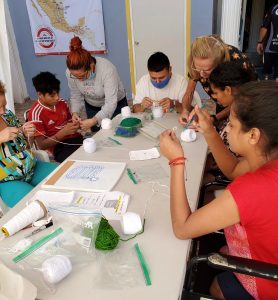There is a place — on a side street in the ragged city of Celaya, here in the central mountains of Mexico — where miracles happen. This place houses, feeds, clothes, and lovingly cares for migrants, mainly from Central America, passing through Mexico, many of whom have been seriously injured in transit.
This miraculous place is ABBA House (Abba meaning Father in Aramaic), which was created in 2015 by a Christian minister, Pastor Ignacio Martinez Ramirez, who has dedicated his life to living Christ’s teachings. He is especially devoted to helping migrants: Two months ago he earned a law degree with a view to specializing in Immigration law.
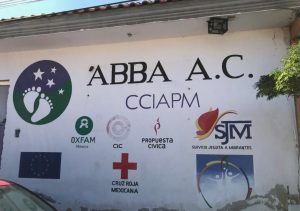
According to Stan Allen — a fellow former Peace Corps Volunteer (Stan served in Venezuela from 1969-71, and I in Gabon from 1996-98) and, like me, a resident of San Miguel de Allende — who has worked as a faithful volunteer at ABBA House for four years, ABBA is “a remarkably committed village united by our shared humanity with one of the most vulnerable, too often villainized, and totally at-risk groups of people who just want what we all want — a life free from fear, violence, poverty, insecurity of every kind, and better opportunities for ourselves and our children.”
As organizer of the Go Fund Me page for ABBA House, Stan is proud to add, “Through our combined donations and commitment, we have made positive and significant differences in the lives of over 36,000 migrants-refugees, raising close to $120,000 (USD) to date.
“Our Go Fund Me has offered unrelenting material support – such as weekly groceries and fresh meats, backpacks, new underwear and socks, shoes, meds and other items (often totaling over $500 USD per week) – as well as emotional uplift and a caring community that validates the human dignity of the ‘strangers in our midst’.”
ABBA House is located in Celaya because this city sits at the crossroads of Mexico’s rail line and is a vital – as well as lethal – mode of transport for migrants heading to the U.S. These trains are called “La Bestia” (the beast) by the migrants, who in desperation hitch rides on them, often clinging to their tops and sides. Many fall off and lose limbs in the process.
ABBA House hosts four distinct groups of migrants: those who are passing through briefly (up to a few days’ stay) on their way north; those who are seriously injured, such as amputees (assisted by the Red Cross) who remain in ABBA’s care during their healing process; those who are repatriating, who have decided to give up their quest for a new life in the U.S. and return to their countries of origin; and those who are applying to remain in Mexico. There is no cost to the residents for any of this aid.
This week, I had the privilege of visiting ABBA House for the first time to help with a new project there organized by my friend Toni Roberts. (See my interview with Toni of several years ago: www.blog.bonnieleeblack.com/for-the-kids/ .)
Stan drove Toni, me, and another knitter/crocheter, Suzzi ViTaris to ABBA House in Celaya this past Wednesday, leading us in a rousing chorus of his favorite ditty, “This Little Light of Mine, (I’m gonna let it shine!)” in the car. At ABBA, we three women taught both knitting and crocheting to the long-term residents who wished to join our classes.
Here are a few photos I took, between teaching my beginners group how to crochet a simple, white (bleachable) cotton wash cloth:
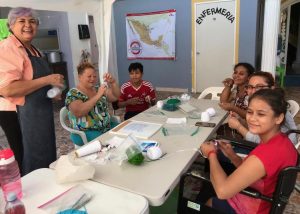
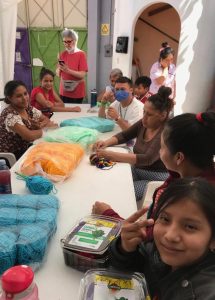
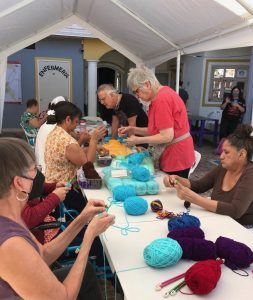
And here’s a photo Toni took of me (I’m at the upper right) with my group:
To quote Stan again, “This albergue [hostel] for migrants not only offers rest, recuperation, safety and humanitarian care but also opportunities to share in community and the fun and confidence of learning new skills. You can see pure joy on the faces of our residents — who have lost and sacrificed so much — when they learn how to create something personal out of nothing.”
~ ~ ~ ~ ~ ~ ~ ~
- To share in the joy at ABBA House by contributing to their Go Fund Me effort, and to read Stan’s regular updates, visit: https://www.GoFundMe.com/abba-house-sanctuary-for-migrants-and-families/
- To see Stan Allen, Pastor Ignacio, and others’ May 2021 Rotary International Zoom presentation about ABBA House, go to: ABBA House: Human Rights Advocates [] Rotary Club Presentation
- To see a short video on ABBA House from one of its many supporters, the Latin American Relief Fund, go to: https://youtu.be/DanqRfhk10U . And to make a tax-deductible donation to the Latin American Relief Fund, go to: www.latinamericanrelieffund.org
- To see Filmmaker Judy Jackson’s riveting 53-minute video, “Where Can We Live in Peace?” about ABBA House and the migrant crisis, go to: https://vimeo.com/438041292

